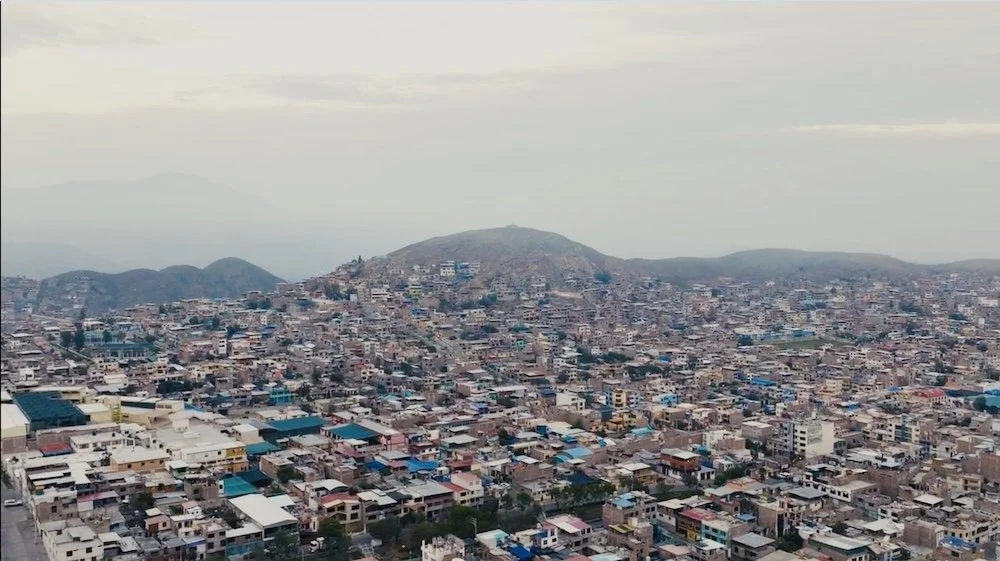Buenos días from Hunter Hill! I love to get above the city, and this is one of my favorite spots to see the city from a different perspective. I didn’t get the chance to take HULA 2024 up here, so I decided to document it with pictures and words for them, and also for you. Some of you have been up here with me before, so for you I hope this is a helpful reminder of our shared prayer in Arequipa.
Church in Arequipa: Prayer
Sundays in Arequipa are currently focused on prayer. Personally, I have felt convicted to pray more about the work. Knowing the prayerfulness of some brothers and sisters who are worthy of imitation, I always feel I should be more prayerful. The difference now is that I am feeling called, urged, prompted to pray. I hesitate to say "more," though, as if the issue were quantity. It is, I think, about a way of seeing the world—perceiving the need to live, think, and speak more according to the way things really are. Prayer, it seems, is often a matter of listening and looking, hearing and seeing, fixing eyes and mind on a dimension of reality that we call unseen.
Church in Arequipa: CeDeTe
Church in Arequipa: Commitment
Part 10: Theological Education as Missional Equipping
No one is really in a position to say what missional means—it’s still under negotiation among those who care about the precision with which we use words connected to important ideas. The ideas to which missional is connected are very important, in my opinion, but the discussion of the word for the last decade or so has been especially fraught because it is also about a movement. Local expressions of Christianity are changing, and some (hopefully much) of what is emerging is about a realignment with God’s mission. In part, this means recontextualizing the gospel, and therefore the church, in Western postmodern subcultures. And in part it means correcting some of the assumptions and structures that have long prevented congregations everywhere from participating in God’s mission to the extent they might have.
Part 9: Decision-Making and the Offering
After months of studying the offering, at our last general meeting the Peruvian disciples made some decisions about our collective practice of giving as a network of house churches. Each group will have an envelope available at every Sunday meeting, placed somewhere out of the way, in which those who wish can discretely place their offering. Two people will count the offering together after the meeting, seal the envelope, record the amount, and both sign the envelop. The church elected Etelvina, Paty, and Alfredo to administrate the money received.
Part 8: Membership
How do you suppose the early church thought about “membership”? Or did they? Of course, the New Testament doesn’t mention anything about it. There are a number of references to specific house churches, which were identified by the owners of the houses (Rom 16:5; 1 Cor 16:19; Col 4:15; Philem 2). This doesn’t tell us much except that the owners were fixed members of particular congregations.
Part 7: The Dandelion Church
The thing about a multiplying, mobile, organic church network is that it is unstable. Of course, one missionary’s unstable is another missionary’s flexible and dynamic. The question most missionaries ask themselves, though, is, what am I leaving behind? Stability is alluring because it provides an answer to that question. The located, identifiable entity makes me feel sure that the investment paid off. The evidence of my work is X number of churches planted in X locations.
Part 6: Spiritual Gifts
I am increasingly convinced that I don’t understand spiritual gifts. I think that the way in which they are stifled in many church structures is detrimental to the wellbeing of the whole body--the “common good” (1 Cor 12:7). We tend to focus all our mutual edification expectations on a few “ministers” and on the abstract notion of fellowship--just being together. Then there is also a tendency to let personality and proclivity, in a variety of ways, to overpower the underlying reality of the Spirit’s work. And lying like a patina over the whole discussion is the doubt about emotionalism and, no less, the rationalist’s ironically overly emotional reaction to emotionalism. But while I can lay out these issues, I’m unsure just how to approach the situation. For, in addition to my lack of clarity, there is a tension in our kingdom-sowing situation that has gifts at its heart.
Part 5: Dependency
My in-laws recently visited. My father-in-law, Steve, has the interesting role of being both parent and elder in our situation. Just before flying back to the US, Steve was sitting at our “dining room” table, fielding translated questions from the Peruvian church members and visitors. One of the church members, who has spent most of his life in traditional Church of Christ settings but has come to appreciate our style, asked how many members Cedar Lane has. “Close to five hundred,” Steve replied. “And do you meet in homes like we do?” continued the brother. “We have a large building where we all meet on Sunday morning, but we meet in small groups on Sunday evenings,” explained Steve. “So how does it affect you to meet with us in a home and share a meal as we do here,” asked the brother. He is still sorting through what this church model means and how others, such as a church elder, might feel about our strange “new” way of assembling on Sunday.
